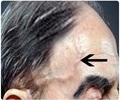People who suffer from a narrowing of the arteries that lead to the kidneys, or renal artery stenosis, do not experience better outcomes when renal stenting is used finds a national research trial.

The CORAL (Cardiovascular Outcomes in Renal Atherosclerotic Lesions) study, which was the first randomized, controlled study to look at this issue, involved 947 participants at more than 100 sites in the U.S., Canada, South American, Europe, Australia and New Zealand. The participants all had atherosclerotic renal-artery stenosis and either systolic hypertension on two or more drugs or chronic kidney disease. They were randomly assigned to medical therapy plus renal-artery stenting or medical therapy alone.
Participants were then followed for up to seven years to monitor for significant clinical events, such as cardiovascular or renal death, myocardial infarction, stroke, hospitalization for congestive heart failure, progressive renal insufficiency or renal replacement therapy.
"Renal-artery stenosis is a significant public health issue, so it was important that we go beyond following blood pressure and kidney function," explained Murphy, an interventional radiologist and the medical director of the Vascular Disease Research Center at Rhode Island Hospital. He was a co-principal investigator for the study. "To really understand what benefits, if any, stenting provided, we needed to look at significant clinical events."
What researchers found was that renal stenting did not make a difference in outcomes for patients.
According to Dworkin, these results are significant as they will lead to a reduction in the number of renal stents that are inserted in patients who experience renal-artery stenosis. "Stents do a good job in opening the arteries, but less invasive medical therapies, which have only gotten better over time, means that patients can often avoid more invasive stenting procedures," he said.
 MEDINDIA
MEDINDIA



 Email
Email










